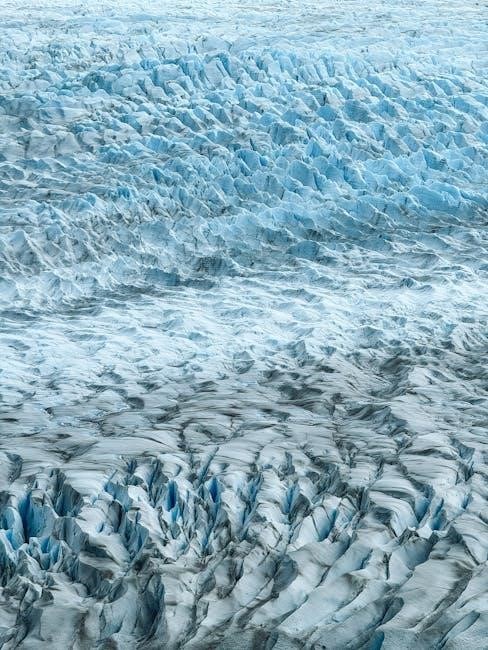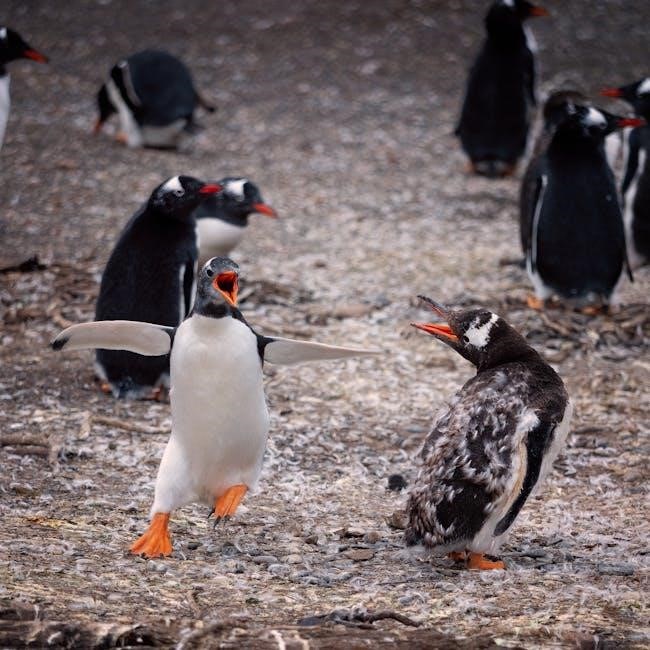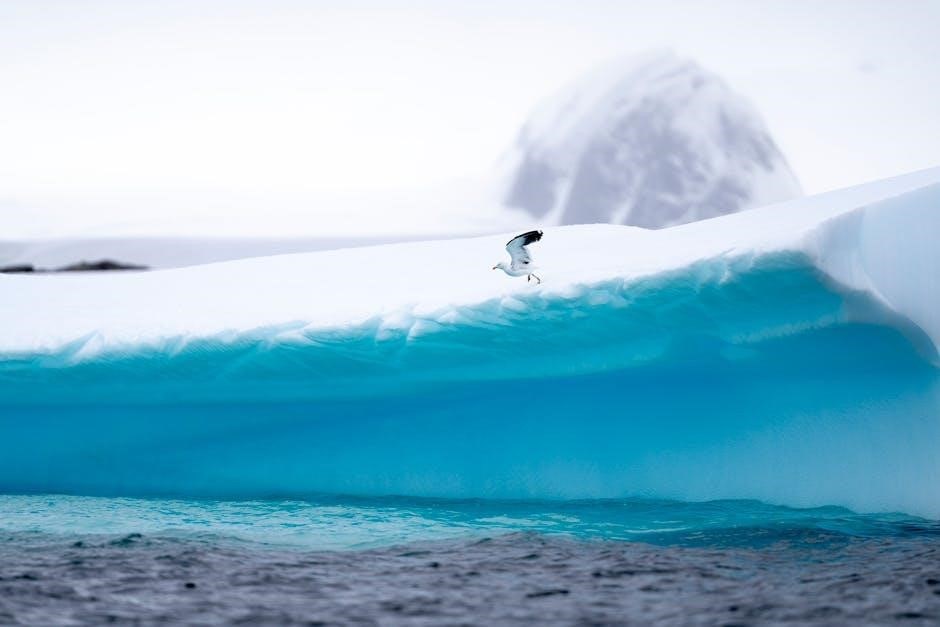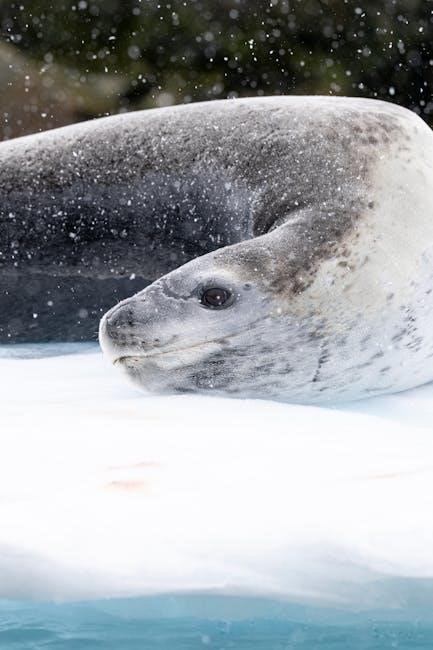out of antarctica pdf
The document explores Antarctica’s unique environment‚ geological significance‚ and its impact on global scientific research and historical discoveries‚ offering insights into its ecosystems and human exploration.
A Brief Overview of the Document
‘Out of Antarctica PDF’ is a comprehensive guide that delves into the scientific‚ historical‚ and environmental aspects of Antarctica. It explores the continent’s unique ecosystems‚ geological formations‚ and the impact of human exploration. The document highlights groundbreaking discoveries‚ such as the presence of ancient fossils and the adaptation of extreme-life forms. It also examines the historical context of Antarctic expeditions‚ detailing the challenges faced by pioneers and the role of military presence. Environmental challenges‚ including climate change and conservation efforts‚ are discussed‚ emphasizing the importance of international collaborations to protect this fragile region. The PDF serves as a valuable resource for researchers‚ students‚ and enthusiasts‚ offering insights into Antarctica’s significance and its relevance to global scientific understanding.
Historical Context and Significance

Antarctica’s history is marked by early explorations and pioneering efforts to uncover its secrets; The continent’s remote and inhospitable environment posed significant challenges for early expeditions‚ making it one of the last regions on Earth to be thoroughly explored. The document highlights the contributions of key figures and expeditions that shaped our understanding of Antarctica. It also delves into the historical significance of military presence‚ which played a role in shaping the continent’s geopolitical landscape. The historical context provided in the PDF underscores the importance of preserving Antarctica’s pristine environment and its unique ecosystems. By examining the past‚ the document emphasizes the need for responsible stewardship and international cooperation to protect this fragile and scientifically vital region for future generations. The historical narrative serves as a foundation for understanding the continent’s current state and global relevance.
Scientific Relevance and Discoveries
Antarctica’s unique environment has made it a hub for groundbreaking scientific research. The continent’s extreme conditions and untouched landscapes provide scientists with unparalleled opportunities to study climate change‚ unique ecosystems‚ and geological formations. Discoveries such as ancient ice cores reveal crucial information about Earth’s climate history‚ while the isolation of certain regions has led to the identification of novel species. The PDF highlights how these findings contribute to global scientific understanding‚ offering insights into biodiversity‚ geological processes‚ and the impacts of climate change. By examining these discoveries‚ researchers can better predict future environmental shifts and develop strategies to mitigate their effects. The scientific relevance of Antarctica’s discoveries underscores its importance as a natural laboratory for advancing human knowledge and addressing global challenges.

Scientific Discoveries Revealed in ‘Out of Antarctica PDF’
The document unveils groundbreaking discoveries‚ including ice core climate data‚ unique species‚ and geological insights‚ shedding light on Earth’s history and climate change impacts globally.
Geological Findings and Their Implications
The document reveals extraordinary geological discoveries in Antarctica‚ including ancient ice cores and fossils‚ which provide critical insights into Earth’s climate history. These findings highlight the continent’s role in understanding global climate patterns and past geological events. The ice cores contain trapped air bubbles‚ offering data on atmospheric composition over millennia‚ while fossils suggest life once thrived in a warmer Antarctica. Geological studies also expose the continent’s potential for mineral resources‚ sparking debates about sustainable exploration. These discoveries underscore the importance of preserving Antarctica’s pristine environment while advancing scientific knowledge. The findings have profound implications for climate change research and Earth’s geological history‚ making Antarctica a vital location for future scientific investigations.
Biological Discoveries and Unique Ecosystems

Antarctica’s extreme environment harbors unique and resilient life forms‚ revealing fascinating biological discoveries. The document highlights the existence of extremophiles‚ organisms thriving in freezing temperatures and high salinity‚ which have expanded our understanding of life’s adaptability. These microbes play a crucial role in ecosystems‚ influencing nutrient cycles and carbon sequestration. Additionally‚ the continent’s surrounding waters support diverse marine life‚ including blue whales‚ seals‚ and penguins‚ which rely on krill-rich waters. However‚ climate change threatens these ecosystems‚ with melting ice altering habitats and food chains. The PDF underscores the importance of preserving Antarctica’s biodiversity‚ emphasizing its global ecological significance. These discoveries not only deepen our appreciation for life’s resilience but also highlight the urgent need for conservation efforts to protect these fragile ecosystems from human impact and environmental shifts.
Historical Explorations Documented in ‘Out of Antarctica PDF’

The PDF details pioneering expeditions‚ including Robert Falcon Scott and Ernest Shackleton‚ highlighting their bravery and contributions to Antarctic exploration‚ while also examining the impact of military presence.
Early Expeditions and Pioneers
The document sheds light on the courageous journeys of early explorers like Robert Falcon Scott and Ernest Shackleton‚ who braved the harsh Antarctic environment in the early 20th century. Their expeditions were pivotal in mapping the continent and understanding its geography; The PDF highlights the challenges they faced‚ including extreme weather conditions and logistical difficulties‚ while also emphasizing their groundbreaking discoveries. These pioneers laid the foundation for modern Antarctic research‚ inspiring future scientists and adventurers alike. Their stories are a testament to human resilience and the quest for knowledge‚ showcasing the historical significance of their contributions to the exploration of this remote and fascinating land. The ‘Out of Antarctica PDF’ offers a detailed account of these expeditions‚ providing insights into the lives of these trailblazers and their enduring legacy.
Military Presence and Its Impact
The ‘Out of Antarctica PDF’ delves into the historical and contemporary military presence on the continent‚ highlighting the strategic interests of various nations. During the Cold War‚ countries like the United States and the Soviet Union established bases in Antarctica‚ often under the guise of scientific research. This military presence raised concerns about the potential for conflict and the exploitation of resources. The document reveals how these activities have impacted the fragile Antarctic environment‚ including pollution from waste disposal and the disruption of ecosystems. Despite the Antarctic Treaty’s emphasis on peaceful use‚ the legacy of military involvement remains a contentious issue. The PDF underscores the need for international cooperation to balance security interests with environmental preservation‚ ensuring that Antarctica remains a symbol of global collaboration rather than a theater for geopolitical rivalry. This section provides a critical perspective on the intersection of military activities and Antarctic conservation.

Conservation Efforts Highlighted in ‘Out of Antarctica PDF’
The document emphasizes global initiatives to protect Antarctica’s fragile ecosystems‚ detailing international agreements and collaborative efforts to address environmental challenges and preserve its unique biodiversity for future generations.
Environmental Challenges and Solutions
Antarctica faces significant environmental challenges‚ including climate change‚ melting ice caps‚ and pollution. Rising temperatures threaten its delicate ecosystems‚ with potential sea-level rises affecting global coastlines. To combat these issues‚ international collaborations have established strict regulations to minimize human impact. Solutions include reducing carbon emissions‚ enforcing waste management protocols‚ and creating protected areas to safeguard biodiversity. Additionally‚ scientific research focuses on monitoring ice melt and developing sustainable practices to preserve Antarctica’s pristine environment. These efforts aim to balance human exploration with environmental conservation‚ ensuring the continent remains a natural wonder for future generations. The document highlights the urgency of these challenges and the importance of global cooperation in implementing effective solutions to protect Antarctica’s fragile landscape.
International Agreements and Collaborations
Antarctica’s governance is shaped by international agreements‚ most notably the Antarctic Treaty System‚ which promotes peaceful use and environmental protection. The treaty‚ signed by over 50 nations‚ establishes Antarctica as a natural reserve‚ devoted to peace and science. Collaborative efforts include joint research projects‚ such as climate change studies‚ and shared initiatives to preserve biodiversity. The Protocol on Environmental Protection‚ known as the Madrid Protocol‚ further strengthens conservation by banning mining and restricting tourism. These agreements foster global cooperation‚ ensuring that Antarctica’s resources are managed sustainably. International collaborations also address challenges like pollution and overfishing‚ emphasizing the importance of collective action. By uniting nations‚ these agreements safeguard Antarctica’s future‚ balancing scientific advancement with environmental stewardship. Such collaborations are vital for maintaining the continent’s pristine state and addressing global environmental concerns.
The ‘Out of Antarctica PDF’ serves as a comprehensive guide to understanding the continent’s environmental‚ historical‚ and scientific significance. It highlights the importance of international collaboration in preserving Antarctica’s pristine ecosystems and addressing global challenges such as climate change. By exploring geological discoveries‚ unique biodiversity‚ and historical expeditions‚ the document underscores the continent’s role in advancing scientific knowledge. Additionally‚ it emphasizes the need for sustainable practices and conservation efforts to protect Antarctica’s fragile environment. The PDF is a valuable resource for researchers‚ policymakers‚ and enthusiasts alike‚ offering insights into the interconnectedness of human exploration‚ scientific research‚ and environmental stewardship. Its relevance lies in its ability to inspire future generations to prioritize the preservation of this unparalleled natural wonder. Through its detailed narrative‚ the document advocates for a balanced approach to exploration and conservation‚ ensuring Antarctica’s legacy endures for centuries to come.

